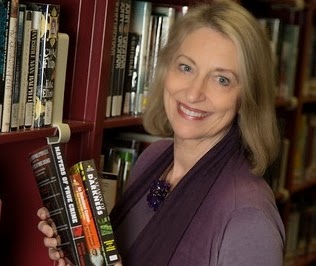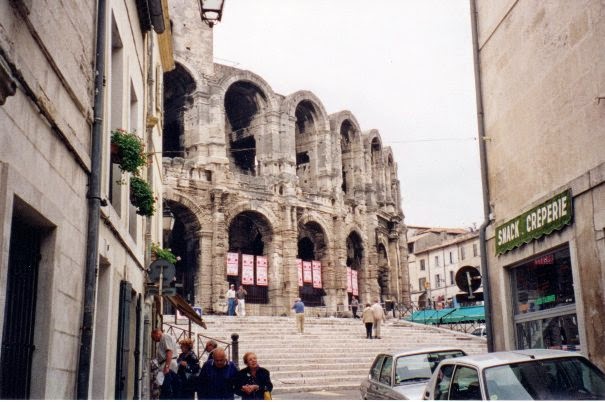Patricia, who was kind enough to invite me as a guest blogger, suggested that readers might like to know how I chose Provence as the setting for my first book in the Jordan Mayfair Mystery Series. Whenever I tell people that my mystery is set in Provence, often their eyes widen and they say, “Oh, Provence!” It’s one of those places that immediately connect with pictures we’ve conjured up in our own minds – like Jordan Mayfair’s “visions of Roman ruins bathed in magical Provencal light, exquisite foods and wines, and alluring Frenchmen.” That’s before mystery and murder kick in, of course. Setting can be a big draw, and I’m counting on setting to play a vital role in this series – Provence, then Ireland, then an Italian locale that I’ll determine after a trip to Florence and the surrounding countryside this summer.
So how did I choose Provence? I didn’t, exactly. Provence chose me.
It’s been several years now since I made my first trip. I wasn’t there for research. As an architectural student, my daughter had traveled with a college group to the region and had provided me with all the information she’d been given. “You just have to go!” she’d said.
The little hotel she recommended in the little village of Fontvieille was delightful, and I was drawn to an abandoned structure on the property – stone, of course – that had to be centuries old, like so many of the historic sites in the region. The wheels of my imagination began to turn. Wouldn’t this make a good mystery? Who would the protagonist be? An architect! Yes, I could see how an architect’s professional skills and knowledge and curiosity would come into play. As I mulled over these ideas, I was traveling to other amazing sites in the area and recognizing opportunities for my protagonist to be “pursued.” Visiting the huge amphitheater in the heart of Arles, built between the first and second centuries, I saw the potential for a “big scene.” Before my trip ended, I had the basic elements of the story. After my second trip to Provence, a chance to check my facts and discover even more material for the book, I was sure I wanted to do a series, each in a foreign setting. Maybe that would never have happened if I hadn’t first been captivated by Provence.
Online research has its place in my writing, but I can’t get my mind around a particular setting unless I’ve been there, walked among the inhabitants, experienced the ambiance. That’s just me. Other writers may find their online research sufficient. With the world at our fingertips, we can find out most factual information about any location. What’s the weather like at a given time? Check weather charts. What would you eat in a local restaurant? Pull up menus from the restaurants’ websites. What’s the distance? What’s the cost? All of these details are essential in making a setting authentic and easy to gather from Internet research.
But being there allowed me to add texture and depth. An example is that unique Provencal light, the light that inspired all those 19th century Impressionist painters. I might have found adequate descriptions without real-life research, but I wouldn’t have even known that the light was such a big deal if I hadn’t experienced it myself.
Dialogue, given the language issues, was a challenge, but after having spent time in Fontvieille, I could hear the voices of the inhabitants, the thicker accents than I’d encountered in Paris. In my journal I noted the occasional odd turn of phrase and later used that material in creating my fictional proprietor, Jean-Claude, of the fictional hotel, L’hôtel du Soleil.
My editor had to remind me at times that the book was a mystery, not a travelogue, because I was so immersed in the setting that my descriptive passages wanted to go on and on. Point well taken. I paid closer attention when writing Secrets and Shamrocks. It’s true: setting alone can’t carry a mystery, but it is oh so delicious! And there’s nothing quite like being there to get a feel for the real thing.
~~~~~~~~~~~~~~~~~~~~~~~~~
Thanks so much for bringing back great memories of my own trips to the south of France, Phyllis. I love it there and hope to get back one of these days. Can’t wait to read Pursuit in Provence for a little armchair traveling.
Phyllis Gobbell writes a little bit of everything – books, short stories, creative nonfiction, and poetry. She has received awards in both fiction and nonfiction, including Tennessee’s Individual Artist Literary Award. An associate professor of English at Nashville State Community College, she teaches writing and literature. After co-authoring two true-crime books based on high-profile murders in Nashville, she has turned to traditional mysteries. First in the Jordan Mayfair Mystery Series, Pursuit in Provence will be released March 18.
You can learn more about Phyllis and her books at her website and her Amazon.com author page. She can also be found on Facebook.
Phyllis has received wonderful reviews for Pursuit in Provence:
BOOKLIST is giving ePursuit in Provence a STARRED REVIEW, March 15: “Gobbell brings the Provence backdrop to vivid life while dropping enough clues to keep readers focused on the mystery involved.”
PUBLISHERS WEEKLY Feb. 20: “Seasoned with humor and evocative descriptions of magnificent historic sites, this whodunit should appeal to fans of both cozies and traditional mysteries.”
KIRKUS REVIEW Jan 1: “Gobbell’s debut, first in a planned series, combines mystery, informative travelogue and enjoyable characters . . .”
LIBRARY JOURNAL Jan. 1:”Gobbell’s debut shows the deadly side of the pursuit of art and how family and friends may not always have your best interests at heart.”












Phyllis makes great use of European settings in her Jordan Mayfair series. I look forward to “traveling’ with her.
Thank you for sharing your techniques for strengthening setting. For example, I had never thought about the important connection between dialogue and setting.
Thanks for being my guest today, Phyllis. The photos bring back lots of pleasant memories.
What an adventure. Thanks for sharing how the setting influenced the story and inspired you.
I love novels that are steeped in unique settings. Yours sounds marvelous. Phyllis, congrats on the fantastic reviews! Definitely big sales are in the offing.
I’m sure visiting the location adds so much depth to the story. Things like smells can’t be found online.
Congratulations, Phyllis!